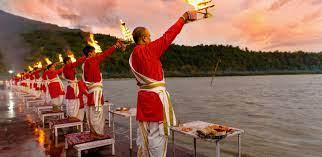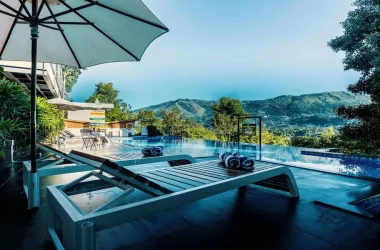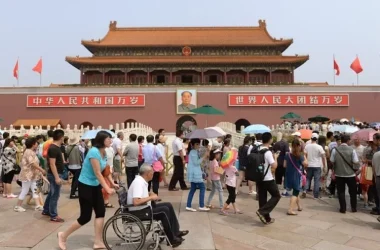Mussoorie, the land known as the ‘Queen of the Hills’, is nature at its most wondrous spectacle waiting to be unveiled in the valleys of Doon. This key mesmerizing location of Uttarakhand was born during the 1800s. Since then, the years have blessed the place with serenity, culture-rooting traditions of the localities and an all-around the year tourism spot resonating with viewpoints, waterfalls, dense forests and somewhere to be cherished by anyone who visits it. The love for Mussoorie has no limits as families, couples and solo travellers; every single person gushes about everything it has to offer, carrying back the most precious memories.
Season to explore the magic of Mussoorie
As a location that can be explored anytime, each season offers a different experience. Winter starting from the end of November, treats you to cold and misty hills, while the peak season from December to the end of January comes with soft snow landing gently on everything you see, painting a white scene and a timeless moment to watch. Early Spring to the end of Summer in the months between mid-February to June is known as the best time to get your tourist vibes going in Mussoorie. Monsoon from July to September has its own charm but is also a bit risky due to unpredictable climatic conditions.
Tempting? Yes, we feel it too. To add to the charm of it, we bring some of the most comfortable and relaxing Hotels in Mussoorie just for you.
Now as you know what to expect while you visit throughout the year, we have something much much more intriguing to tell you that will be your siren call to visit this beautiful hill town as soon as possible.
Discover the pizzaz of Mussoorie’s festivals
The soul and essence of Mussoorie do not just lie in its natural marvel but in its people, their culture, traditions, and the celebration of festivals that roar their charisma. It is known that each of these seasonal extravagant festivals or other events that are held here has a deep meaning that connects to the land, its people, their way of life, their prosperity, and also some are conducted to educate tourists about the spirit of Mussoorie and its people.
Phool Dei
A simple yet sensational festival that is celebrated in Mussoorie is Phool Dei which is celebrated during the month of March or April to bless the house and its people. It’s mainly a carnival marking the joy of Spring where young girls offer and bless the house with a pooja platter filled with rice, coconut, jaggery, flowers and green leaves and decorate the door of the house as well with them. This ends with the community coming together and singing folk songs and dancing the traditional steps to the beats of music.
Bikhauti
The major tradition of Bikhauti is followed by the process of sowing the seeds at the beginning of April. A basket woven with Himalayan bamboo is first layered with soil and then with 7 key grains from wheat, soya bean, barley and maze to others. Then this layering is done a few more times before keeping it for worship. Post 9 to 10 days, the sprouted greens are cut and offered to the god before the elders of the house consume it, and the rest of the family follows in many ways. Various delicacies are enjoyed during this period.
The seeds of the 7 grains, if sprouted in a particular form, it is considered that year will bless them with a plentiful harvest. This event is in sync with the Harela festival and falls around the same time.
Uttarani or Kale Kaua
An ancient festivity which marks the end of Winter in Mussoorie and other parts of Uttarakhand is Uttarani. It is celebrated at the temple closest to land near river Saryu. The holy sites mainly visited during this time and where the fair happens are Bageshwar, Pancheshwar, Salt Mahadev, Rameshwar and Ranibagh.
Some of our favourite Mussoorie Hotels picks to make your travels even more amazing:
Basant Panchami
The honouring of welcoming Spring and bidding goodbye to Winter is the sole reason for this festival. It is enjoyed with great cuisine, playing Holi with various colours and celebrating wearing yellow clothing and tilak as a traditional ritual.
Harela
A yearly festival celebrated during the month of July is the celebration of the beginning of Sraavan Maas according to the Hindu calendar and also welcomes the Monsoon season. During Harela, people talk and promote with slogans around protecting the environment and the greenery of the lands. The event begins with marrying the idols of Lord Shiva and Goddess Parvathi made of clay and then decorated with paint called ‘Dikaras’ to commemorate the blessings received and the harvest.
The takeaway from this festival talks not just about the harvest season but also about saving nature and worshipping it for endowing them with the abundance of love it provides through blessing the people with food, health and prosperity. The locals also plant trees during this season.
Summer and Autumn Festivals
These 2 festivals, though mainly not the root of traditions, is a Government initiative to spread knowledge through holding events, talks, seminars and activities that lure in people from all over the country. Summer and Autumn Festivals are held as these are around peak tourist time, and the opportunity helps the Government educate the tourists about the land and provide local and seasonal entertainment, which includes seasonal sports and activities, competitions and fun events. The events offer education and awareness of the land.
Now that you know how the magnificence of culture and traditions come to life in various regions, even in a place far amidst the foothills of the Himalayas. These festivities echo the songs of the land and its people who have been there protecting nature and living amidst it in harmony. With unique attires, language, food and nature, they tell you tales of the place through their many festivals of the year.
It’s time we appreciate the essence of every culture of the various destinations we visit and embrace each of them through experiencing it while exploring the region.







